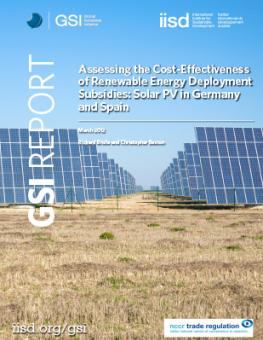
Assessing the Cost-Effectiveness of Renewable Energy Deployment Subsidies: Solar PV in Germany and Spain
This study reviews deployment subsidies for solar PV in two European countries, Germany and Spain. It forms one of a series of three looking at the cost-effectiveness of renewable energy deployment subsidies, each one focusing on different technologies and countries.
This study reviews deployment subsidies for solar PV in two European countries, Germany and Spain.
Its primary goal is to better inform debates about cost-effectiveness by exploring the methods required to assess cost-effectiveness and by estimating the general magnitude and range of benefits in several key areas.
The study forms one of a series of three looking at the cost-effectiveness of renewable energy deployment subsidies, each one focusing on different technologies and countries. The increased deployment of low-carbon energy is one of the principal interventions required to avoid catastrophic climate change. At the same time, the success of deployment will depend upon government policy that is effective and that uses resources efficiently. This is central to maximizing the amount of renewables deployed given the resources that are available and to ensuring that subsidies for renewables remain politically viable. These studies represent a first effort to develop an appropriate multi-criteria framework for evaluating the cost-effectiveness of renewable energy subsidies, taking into account all costs and the wide range of potential benefits.
You might also be interested in
Doubling Back and Doubling Down: G20 scorecard on fossil fuel funding
This study tracks, for the first time, each G20 country's progress on ending support for fossil fuels—ranking their transparency, commitments, and financial support to oil, gas, and coal.
Assessing the Cost-Effectiveness of Renewable Energy Deployment Subsidies: Biomass power in the United Kingdom and Germany
This study reviews deployment subsidies for biomass power in two European countries, Germany and the United Kingdom.
Assessing the Cost-Effectiveness of Renewable Energy Deployment Subsidies: Onshore wind power in Germany and China
The Cost of Fossil Fuel Reliance
Government support for fossil fuels reached at least USD 1.5 trillion in 2023, new data shows.